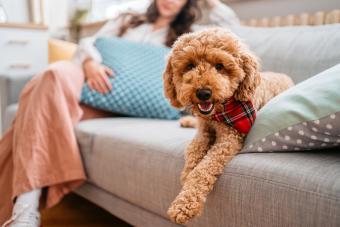
If you're thinking about welcoming a miniature labradoodle into your life, consider adoption as your first choice — it's a wonderful way to give a loving home to a furry friend in need. However, if you're set on buying a puppy, consider these tips while you interview potential mini labradoodle breeders in your area. Your future dog's health and temperament depend on responsible breeding practices. Here's how you can make sure to check if the breeder is taking good care of the dogs, isn't running a puppy mill, and isn't a backyard breeder who won't be screening for important genetic health issues.
Why People Breed Miniature Labradoodles
The labradoodle, especially the miniature labradoodle, is a popular companion dog. Since they are a mix of a mini poodle and a lab, their weight can fluctuate. Their weight generally falls between 26 and 55 pounds, and they often stand between 14 and 17 inches tall. Pups are usually incredibly affectionate and easy-to-train, as long as they have been socialized and cared for from infancy.
Unfortunately, their popularity as companion pets in the U.S. has also made miniature labradoodles a popular breed for unscrupulous breeders, so screening a prospective breeder is really important. Puppies born in mills often have illnesses or genetic conditions, and backyard breeders typically don't consider the parent's health (and what will pass to your puppy) prior to breeding.
The Connection Between Mini Labradoodles and Puppy Mills
Unfortunately, designer breeds are incredibly common at puppy mills. A study published in Animals Journal explained that "an estimated 20 percent of dogs bred in puppy mills are designer dogs." Since they're so easy to sell and the price dog lovers will pay for these puppies is so high, they tend to be one of the puppy mill industry's favorite dog types.
The researchers continued to explain that "dogs purchased as puppies from these establishments often display greater rates of fear, house soiling, separation-related problems, and aggression towards people and other dogs than do puppies from other breeding establishments."
Related: 12 Must-Know Signs of a Puppy Mill
Interviewing a Responsible Breeder

When you search for the perfect pup for your family, you'll want to do some research (online and personally, if possible) to find a responsible miniature labradoodle breeder. Good breeders will be highly selective in their choice of which dogs to breed, the timing of the litters, and the care of the dogs. When you screen a potential breeder, make sure to ask:
How Many Litters Do You Have a Year?
A responsible breeder should have only one or two litters each year, ensuring the breeder has enough time to give each puppy the right amount of attention, socialization, and care. The only exception would be if the breeder has a sizable staff that can provide individualized attention for a larger number of annual litters.
How Many Breeds Do You Work With?
Someone who is breeding due to their love for a breed and their concern for future generations isn't likely to work with more than two dog breeds. They may also be involved in breed clubs, shows, and competitions to show off their passion for the dog breeds they're crazy about.
A responsible breeder works to enhance future generations of a dog breed they love, including doing all the prenatal and genetic screening recommended to prevent hereditary issues from being passed down.
How Old Are The Breeding Parents?
A good breeder only breeds dogs that are over a year and a half old.
How Many Litters Has Mom Had Total?
Reputable breeders stop breeding any female dog, regardless of breed, once they have delivered a maximum of three to four litters to avoid health impact to the female.
Where Are the Puppies Born and Raised?
Puppies should be raised in the breeder's home (not a kennel) from birth. The area they're kept in should be clean, spacious, and warm. They should also be kept with their mother and littermates, at least until they're weaned. If they can be kept until 12 weeks, that's the best case scenario for socialization and care purposes.
Responsible breeders have no problem being completely transparent and should be comfortable showing you where the puppies were raised.
Can I See the Parent's Vaccination Records & Tests?
A responsible breeder will include copies of vaccination certificates and genetic screening in the papers given to the new puppy parent.
If the mother's vaccines aren't current, the puppies’ ability to resist disease may be compromised.
Can You Tell Me About Temperament and Health?
Responsible breeders can answer most questions about temperament and health issues and provide care advice. The breeder should be willing to answer specific questions about the health and temperament of a litter's parents.
Questions a Responsible Breeder Will Ask You

Responsible mini labradoodle breeders don't do this for the money. In fact, they're lucky if they break even with expenses if they're providing the veterinary care and socialization a proper breeder should. For this reason, a reputable breeder will have questions for you as well. It's a major red flag if a breeder doesn't want to see your home, ask for references, or have other conditions about selling you a puppy.
Breeders offering to "ship" puppies via cargo to sight-unseen homes are almost guaranteed to be puppy mills.
Reputable Breeders Ask About Other Pets
Reputable breeders will ask questions about other household pets and may require the existing pets to meet the new puppy to make sure their temperaments match.
Check on Initial Health Care
Reputable breeders have a vet contact who cares for their litters. Their vet contact often provides initial care to the pups, in addition to being on-call for the breeder if necessary. The initial care (before the puppies are adopted) includes the first vaccination and a full health care check. Likewise, a responsible breeder will want to check on you to be sure you've been providing your own pets the vaccinations and the healthcare they need. They'll likely ask for a vet reference.
Good Breeders Explain Appropriate Puppy Care
A responsible breeder should provide detailed instructions on puppy care, food recommendations, and training advice. They can tell you what usually works, what doesn't, and what to expect during the next few weeks.
Reputable Breeders Often Encourage Dogs to Return
A good breeder should insist that a customer can and needs to return the dog at any age if he can no longer care for the dog. In fact, the written contract may require that the customer promise not to ever turn the dog into an animal shelter.
Reputable Mini Labradoodle Breeders Will Screen For
Breeders that truly care about the health of future generations will test their mini labradoodles for a list of conditions specific to labrador retrievers and poodles.
Labrador Retriever Screening Tests
According to Pippa Mattinson, the Founder of the Gundog Trust, responsible breeders screen labradors for:
- Hip and elbow dysplasia
- PRA (progressive retinal atrophy)
- Skeletal dysplasia, a form of dwarfism (not all will screen for this)
To "pass" the tests, labs must have a hip score lower than the breed's average, a score of 0 for elbow dysplasia, and a clear PRA screen.
One dog can be a carrier of PRA if the other parent is clear.
Poodle Screening Tests
The Orthopedic Foundation for Animals (OFA) advises breeders to perform comprehensive health screenings on poodles, including:
- PRA
- Hip dysplasia
- Patellar luxation
PRA screening is vital for preventing retinal deterioration and potential blindness, while tests for hip dysplasia and patellar luxation are crucial for the breed's skeletal and joint health.
What Else Makes Responsible Breeders Stand Out

On top of the components above, unlike puppy mills, most reputable breeders won't freely give away their dogs.
No Country-Wide Shipping Option
The majority of reputable breeders don't offer a country-wide shipping option. If they do, they will have someone the puppy knows go with them to drop off the pup and perform an in-person home inspection prior to drop off.
An Extensive Application Process
Many breeders have a comprehensive application process that includes an initial phone interview and then meetings with all family members. The process may also include a house visit. Good breeders require this type of application process because they want to make sure that you have the right home environment for a doodle, understand the needs of the breed, and have a commitment to dog ownership.
Requiring an Adoption Contract
Once the prospective applicant goes through the process, a reputable breeder will have the prospective puppy parent sign an adoption contract.
Knowledge About Individual Puppies
Every puppy is different and will have their own personality. A reputable breeder will be able to speak to each different puppy's temperament, likes and dislikes they have learned, and any quirks the pup may have.
First Generation vs. Multi-Generation Breeding
Since mini doodles are popular, some breeders breed any labrador with any poodle or excessively cross-breed labradoodles. Breeders disagree over whether or not these dogs should be crossed with other labradoodles since this multi-generational breeding sometimes produces health and temperament issues.
Many doodle breeders only breed first-generation dogs, meaning that one parent is a lab and the other is a poodle, or they breed backcross labradoodles. These dogs are the result of breeding a first-generation labradoodle with a non-related poodle.
Breeding a first-generation labradoodle with a poodle tends to result in healthier pups.
Healthy Dogs Come From Responsible Breeders
If you're committed to buying, getting a puppy from a responsible breeder will help you find a healthy dog and protect you from pet sale scams. Research breeders carefully, and you will find the right dog for your family who you can love for many years to come.







